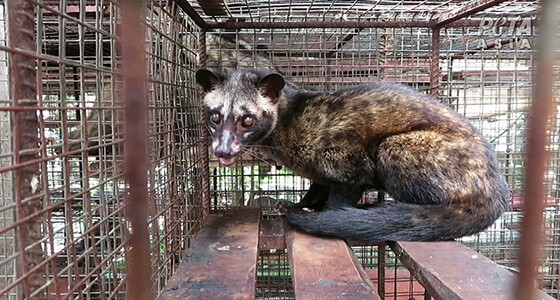Update (7 December 2022)
PETA Asia’s latest investigation into the cruel kopi luwak industry shows that despite an international outcry about the suffering of civet cats following our exposé, nothing has changed. The shocking new footage from a kopi luwak coffee farm in Indonesia reveals the toll that constant confinement to a cramped wire cage has taken on a sensitive Asian palm civet.
Although Asian palm civets are a protected species under the Convention on International Trade in Endangered Species of Wild Fauna and Flora, these most recent findings mirror what investigators uncovered during previous exposés of the kopi luwak industry: pervasive cruelty on every single farm.
A Disgrace, Not a Delicacy
Originally posted on 24 November, 2021:
Made from the beans of coffee berries that have been eaten and excreted by the Asian palm civet, or civet cat, “kopi luwak” or “cat-poop coffee” can be found in cafés and coffee gardens in Bali, Indonesia, and elsewhere. Tourists are often unaware of the cruel treatment of these normally solitary civet cats, and when they visit these cafés and buy kopi luwak, they may be lied to and told that the excrement of wild animals is harvested from the ground. Now, they can see what really happens to civet cats exploited for coffee.
Investigators visited civet cat farms in Bali and found unbearable conditions at every single one. They also went to the live-animal markets that sell potentially sick civet cats and saw how easily they could spread deadly diseases to other animals, including humans.
Watch the video to see for yourself how civet cats are suffering for this disgusting drink and find out what you can do to help them.
Watch Now
The Next Pandemic Is Brewing
To make kopi luwak, civet cats are captured from their natural habitat in Indonesia when they’re about 6 months old or bought at live-animal markets. They are confined to miserably small cages and fed an unhealthy, unnatural diet that consists primarily of coffee cherries so that the producer can harvest the coffee beans from their faeces. The coffee is exported all over the world, even though researchers believe that the SARS pandemic, which spread from Asia to more than two dozen countries around the world, had passed from civet cats to humans. Scientists have also identified civet cats as a possible “intermediate host” for COVID-19, as the novel coronavirus believed to have originated in bats mutated into a form that could infect humans.
If civet cats do not die before their usefulness to the kopi luwak industry has expired, the stressed, sick animals may be sold at live-animal markets, putting them in direct contact with humans and animals of other species. This creates the perfect breeding ground for animal-borne diseases, such as coronaviruses, to mutate and pass from one host to another before spreading to humans.
Cruelty in a Cup
In addition to the infection risk posed by the farming of and trade in civet cats, investigators found pervasive cruelty at every farm they visited. The animals were commonly confined to barren, filthy cages encrusted with faeces, dirt, and decomposing coffee cherries.
These nocturnal animals were kept mostly in outdoor cages in the sunlight with no dark, quiet spot to sleep in during the day, adding to their misery and poor health. Some panted constantly in the heat.
Many had painful open wounds for which they did not appear to receive any veterinary care, and they exhibited stereotypic behaviour such as biting their own tails and pacing back and forth – indicators of severe psychological distress.
Investigators saw one civet cat who appeared to be blind but was still being used for kopi luwak production.
This isn’t the first time this kind of cruelty has been discovered. PETA Asia first exposed the appalling treatment of civet cats in Indonesia in 2013. It’s been seven years, yet nothing has changed.
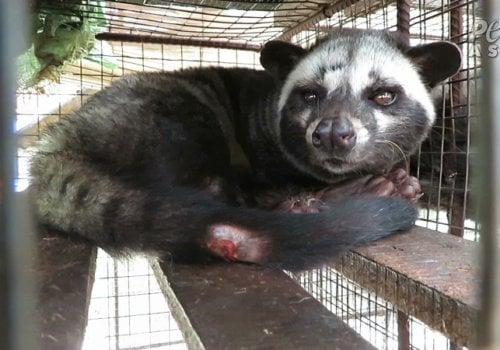
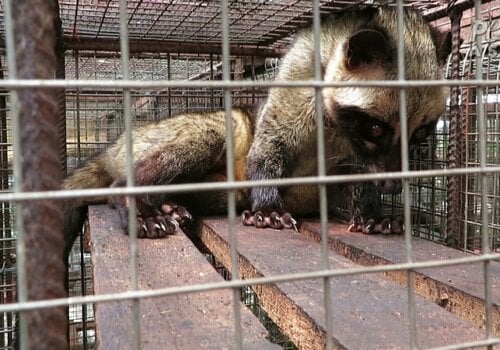
Labelling Lies
Although kopi luwak is often advertised as “wild-sourced”, one farmer told an eyewitness that it would be nearly impossible to source it exclusively from the wild.
Producers also suggested deliberately mislabelling coffee from captive civet cats. One admitted that they may collect a small amount of faeces produced by free-roaming wild civet cats in the forest and mix it in with the faeces produced by the caged civet cats so they can claim that their coffee is wild-sourced.
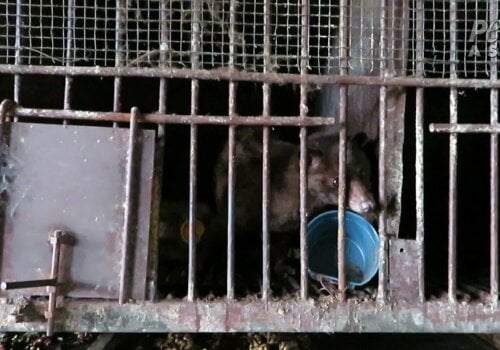
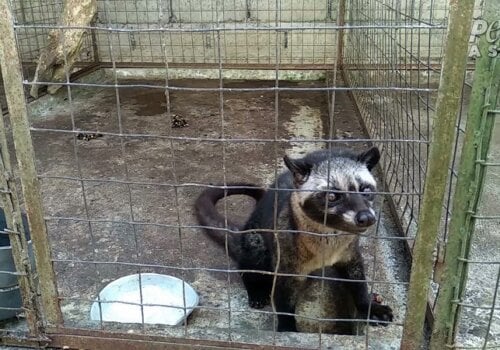
It’s Time to Cut the Crap
Coffee made from beans excreted by imprisoned, stressed, unhealthy animals who have been deprived of everything that is natural and important to them isn’t a delicacy – it’s a disgrace. And it’s another pandemic in the making.
As kopi luwak is exported overseas, no matter which country you are in or what assurances you have received, please don’t purchase or drink it.
You Can Help
Don’t be duped – make sure your coffee doesn’t contain cruelty. Please take action now and tell Bacha Coffee to stop selling “cat poop coffee”:
Take Action
